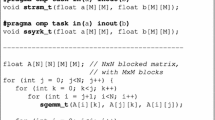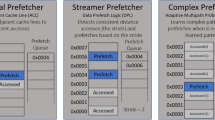Abstract
Data deduplication has been widely utilized in large-scale storage systems, particularly backup systems. Data deduplication systems typically divide data streams into chunks and identify redundant chunks by comparing chunk fingerprints. Maintaining all fingerprints in memory is not cost-effective because fingerprint indexes are typically very large. Many data deduplication systems maintain a fingerprint cache in memory and exploit fingerprint prefetching to accelerate the deduplication process. Although fingerprint prefetching can improve the performance of data deduplication systems by leveraging the locality of workloads, inaccurately prefetched fingerprints may pollute the cache by evicting useful fingerprints. We observed that most of the prefetched fingerprints in a wide variety of applications are never used or used only once, which severely limits the performance of data deduplication systems. We introduce a prefetch-aware fingerprint cache management scheme for data deduplication systems (PreCache) to alleviate prefetch-related cache pollution. We propose three prefetch-aware fingerprint cache replacement policies (PreCache-UNU, PreCache-UOO, and PreCache-MIX) to handle different types of cache pollution. Additionally, we propose an adaptive policy selector to select suitable policies for prefetch requests. We implement PreCache on two representative data deduplication systems (Block Locality Caching and SiLo) and evaluate its performance utilizing three real-world workloads (Kernel, MacOS, and Homes). The experimental results reveal that PreCache improves deduplication throughput by up to 32.22% based on a reduction of on-disk fingerprint index lookups and improvement of the deduplication ratio by mitigating prefetch-related fingerprint cache pollution.
Similar content being viewed by others
Explore related subjects
Discover the latest articles and news from researchers in related subjects, suggested using machine learning.References
Meyer D T, Bolosky W J. A study of practical deduplication. ACM Transactions on Storage, 2012, 7(4): 14
Wildani A, Miller E L, Rodeh O. Hands: a heuristically arranged nonbackup in-line deduplication system. In: Proceedings of the 29th IEEE International Conference on Data Engineering. 2013, 446–457
Wallace G, Douglis F, Qian H, Shilane P, Smaldone S, Chamness M, Hsu W. Characteristics of backup workloads in production systems. In: Proceedings of the 10th USENIX Conference on File and Storage Technologies. 2012
Meister D, KaiserS J, Brinkmann A, Cortes T, Kuhn M, Kunkel J. A study on data deduplication in HPC storage systems. In: Proceedings of the International Conference on High Performance Computing, Networking, Storage and Analysis. 2012, 1–11
Bolosky W J, Corbin S, Goebel D, Douceur J R. Single instance storage in Windows 2000. In: Proceedings of the 4th USENIX Windows Systems Symposium. 2000, 13–24
Quinlan S, Dorward S. Venti: a new approach to archival storage. In: Proceedings of USENIX Conference on File and Storage Technologies. 2002, 89–101
Zhu B, Li K, Patterson H. Avoiding the disk bottleneck in the data domain deduplication file system. In: Proceedings of the 6th USENIX Conference on File and Storage Technologies. 2008, 1–14
Lin B, Li S, Liao X, Zhang J, Liu X. Leach: an automatic learning cache for inline primary deduplication system. Frontiers of Computer Science, 2014, 8(2):175–183
Mandal S, Kuenning G, Ok D, Shastry V, Shilane P, Zhen S, Tarasov V, Zadok E. Using hints to improve inline block-layer deduplication. In: Proceedings of the 14th USENIX Conference on File and Storage Technologies. 2016, 315–322
Muthitacharoen A, Chen B, Mazieres D. A low-bandwidth network file system. In: Proceedings of the 8th ACM Symposium on Operating Systems Principles. 2001, 174–187
Shilane P, Huang M, Wallace G, Hsu W. WAN-optimized replication of backup datasets using stream-informed delta compression. ACM Transactions on Storage, 2012, 8(4): 13
Hua Y, Liu X. Scheduling heterogeneous flows with delay-aware deduplication for avionics applications. IEEE Transactions on Parallel and Distributed Systems, 2012, 23(9): 1790–1802
Sun J, Chen H, He L, Tan H. Redundant network traffic elimination with GPU accelerated rabin fingerprinting. IEEE Transactions on Parallel and Distributed Systems, 2016, 27(7): 2130–2142
Lillibridge M, Eshghi K, Bhagwat D, Deolalikar V, Trezis G, Camble P. Sparse indexing: large scale, inline deduplication using sampling and locality. In: Proceedings of the 7th USENIX Conference on File and Storage Technologies. 2009, 111–123
Bhagwat D, Eshghi K, Long D D E, Lillibridge M. Extreme binning: scalable, parallel deduplication for chunk-based file backup. In: Proceedings of the 17th Annual Meeting of the IEEE/ACM International Symposium on Modelling, Analysis and Simulation of Computer and Telecommunication Systems. 2009, 1–9
Meister D, Kaiser J, Brinkmann A. Block locality caching for data deduplication. In: Proceedings of the 6th International Systems and Storage Conference. 2013
Xia W, Jiang H, Feng D, Hua Y. Similarity and locality based indexing for high performance data deduplication. IEEE Transactions on Computers, 2015, 64(4): 1162–1176
Min J, Yoon D, Won Y. Efficient deduplication techniques for modern backup operation. IEEE Transactions on Computers, 2011, 60(6): 824–840
Debnath B, Sengupta S, Li J. Chunkstash: speeding up inline storage deduplication using flash memory. In: Proceedings of USENIX Annual Technical Conference. 2010, 215–230
Guo F, Efstathopoulos P. Building a high-performance deduplication system. In: Proceedings of USENIX Annual Technical Conference. 2011, 271–284
Sun Z, Kuenning G, Mandal S, Shilane P, Tarasov V, Xiao N, Zadok E. A long-term user-centric analysis of deduplication patterns. In: Proceedings of the 32nd International Conference on Massive Storage Systems and Technology. 2016, 1–7
Xia W, Jiang H, Feng D, Douglis F, Shilane P, Hua Y, Fu M, Zhang Y, Zhou Y. A comprehensive study of the past, present, and future of data deduplication. Proceedings of the IEEE, 2016, 104(9):1681–1710
Fu M, Feng D, Hua Y, He X, Chen Z, Xia W, Zhang Y, Tan Y. Design tradeoffs for data deduplication performance in backup workloads. In: Proceedings of the 13th USENIX Conference on File and Storage Technologies. 2015, 331–344
Meister D, Brinkmann A. Dedupv1: improving deduplication throughput using solid state drives (SSD). In: Proceedings of the 26th Symposium on Massive Storage Systems and Technologies. 2010, 1–6
Lu G, Nam Y J, Du D H C. Bloomstore: bloom-filter based memoryefficient key-value store for indexing of data deduplication on flash. In: Proceedings of the 28th Symposium on Mass Storage Systems and Technologies. 2012, 1–11
Chen Z, Shen K. Ordermergededup: efficient, failure-consistent deduplication on flash. In: Proceedings of the 14th USENIX Conference on File and Storage Technologies. 2016, 291–299
Fu Y, Jiang H, Xiao N. A scalable inline cluster deduplication framework for big data protection. In: Proceedings of the ACM/IFIP/USENIX International Conference on Distributed Systems Platforms and Open Distributed Processing. 2012, 354–373
Frey D, Kermarrec A M, Kloudas K. Probabilistic deduplication for cluster-based storage systems. In: Proceedings of the 3rd ACM Symposium on Cloud Computing. 2012
Luo S, Zhang G, Wu C, Khan S, Li K. Boafft: distributed deduplication for big data storage in the cloud. IEEE Transactions on Cloud Computing, 2015, 61(11): 1–13
Jaleel A, Theobald K B, Steely Jr S C, Emer J. High performance cache replacement using re-reference interval prediction (RRIP). In: Proceedings of the 37th Annual International Symposium on Computer Architecture. 2010, 60–71
Wu C J, Jaleel A, Hasenplaugh W, Martonosi M, Steely Jr S C, Emer J. Ship: signature-based hit predictor for high performance caching. In: Proceedings of the 44th Annual IEEE/ACM International Symposium on Microarchitecture. 2011, 430–441
Wu C J, Jaleel A, Martonosi M, Steely Jr S C, Emer J. Pacman: prefetch-aware cache management for high performance caching. In: Proceedings of the 44th Annual IEEE/ACM International Symposium on Microarchitecture. 2011, 442–453
Seshadri V, Yedkar S, Xin H, Mutlu O, Gibbons P B, Kozuch M A, Mowry T C. Mitigating prefetcher-caused pollution using informed caching policies for prefetched blocks. ACM Transactions on Architecture and Code Optimization, 2015, 11(4): 51
Cidon A, Eisenman A, Alizadeh M, Katti S. Cliffhanger: scaling performance cliffs in web memory caches. In: Proceedings of the 13th USENIX Symposium on Networked Systems Design and Implementation. 2016, 379–392
Li M, Zhang H, Wu Y, Zhao C. Memsc: a scan-resistant and compact cache replacement framework for memory-based key-value cache systems. Journal of Computer Science and Technology, 2017, 32(1): 55–67
Acknowledgements
This work was supported by the next generation of information technology strategic research program of Chinese Academy of Sciences (XDA06010600).
Author information
Authors and Affiliations
Corresponding author
Additional information
Mei Li is a PhD candidate in computer software and theory of Institute of Software, Chinese Academy of Sciences, China. She received her BS degree in computer science and technology from Beijing University of Posts and Telecommunications, China in 2011. Her research interests include operating system and cloud computing.
Hongjun Zhang is a PhD candidate in computer software and theory of Institute of Software, Chinese Academy of Sciences, China. He received his BS degree in software engineering from Shandong University, China in 2012. His research interests include operating system and distributed system.
Yanjun Wu received his PhD degree in computer software and theory from Institute of Software, Chinese Academy of Sciences (CAS), China in 2006. Currently, he is a research professor at Institute of Software, CAS. His research interests include operating system and system security.
Chen Zhao received his PhD degree in computer software and theory from Institute of Software, Chinese Academy of Sciences (CAS), China in 2000. Currently, he is a research professor at Institute of Software, CAS. His research interests include compiling, auto-testing, operating system, and networking software.
Electronic supplementary material
Rights and permissions
About this article
Cite this article
Li, M., Zhang, H., Wu, Y. et al. Prefetch-aware fingerprint cache management for data deduplication systems. Front. Comput. Sci. 13, 500–515 (2019). https://doi.org/10.1007/s11704-017-7119-0
Received:
Accepted:
Published:
Issue Date:
DOI: https://doi.org/10.1007/s11704-017-7119-0




